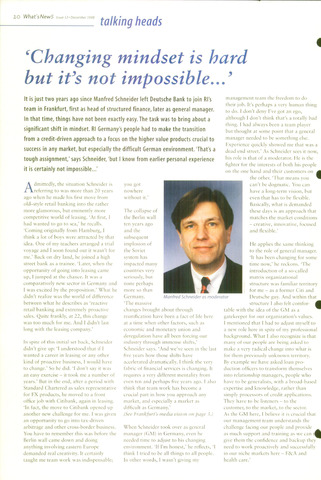'Changing mindset is hard
hut it's not impossible
talking
It is just two years ago since Manfred Schneider left Deutsche Bank to join RI's
team in Frankfurt, first as head of structured finance, later as general manager.
In that time, things have not been exactly easy. The task was to bring about a
significant shift in mindset. Rl Germany's people had to make the transition
from a credit-driven approach to a focus on the higher value products crucial to
success in any market, but especially the difficult German environment.'That's a
tough assignment,' says Schneider, 'but I know from earlier personal experience
it is certainly not impossible...'
2.0 What sNewS Issue 12- December 1998
Admittedly, the situation Schneider is
referring to was more than 20 years
ago when he made his first move from
old-style retail banking into the rather
more glamorous, but eminently more
competitive world of leasing. 'At first, 1
had wanted to go to sea,' he recalls.
'Coming originally from Hamburg, 1
think a lot of boys were attracted by that
idea. One of my teachers arranged a trial
voyage and I soon found out it wasn't for
me.' Back on dry land, he joined a high
street bank as a trainee. 'Later, when the
opportunity of going into leasing came
up, I jumped at the chance. It was a
comparatively new sector in Germany and
I was excited by the proposition.' What he
didn't realize was the world of difference
between what he describes as 'reactive
retail banking and extremely proactive
sales. Quite frankly, at 22, this change
was too much for me. And I didn't last
long with the leasing company.'
In spite of this initial set back, Schneider
didn't give up: 'I understood that if I
wanted a career in leasing or any other
kind of proactive business, I would have
to change.' So he did. 'I don't say it was
an easy exercise - it took me a number of
years.' But in the end, after a period with
Standard Chartered as sales representative
for FX products, he moved to a front
office job with Citibank, again in leasing.
'In fact, the move to Citibank opened up
another new challenge for me. I was given
an opportunity to go into tax-driven
arbitrage and other cross-border business.
You have to remember this was before the
Berlin wall came down and doing
anything involving eastern Europe
demanded real creativity. It certainly
taught me team work was indispensable;
Manfred Schneider as moderator
you got
nowhere
without it.'
The collapse of
the Berlin wall
ten years ago
and the
subsequent
implosion of
the Soviet
system has
impacted many
countries very
seriously, but
none perhaps
more so than
Germany.
'The massive
changes brought about through
reunification have been a fact of life here
at a time when other factors, such as
economie and monetary union and
deregulation have all been forcing our
industry through immense shifts,'
Schneider says. 'And we've seen in the last
five years how those shifts have
accelerated dramatically. I think the very
fabric of financial services is changing. It
requires a very different mentality from
even ten and perhaps five years ago. I also
think that team work has become a
crucial part in how you approach any
market, and especially a market as
difficult as Germany.'
(See Frankfurt's media vision on page 3.)
When Schneider took over as general
manager (GM) in Germany, even he
needed time to adjust to his changing
environment, 'lf I'm honest,' he reflects, 'I
think I tried to be all things to all people.
In other words, I wasn't giving my
management team the freedom to do
their job. It's perhaps a very human thing
to do. I don't deny I've got an ego,
although I don't think that's a totally bad
thing. I had always been a team player
but thought at some point that a general
manager needed to be something else.
Experience quickly showed me that was a
dead end street.' As Schneider sees it now,
his role is that of a moderator. He is the
fighter for the interests of both his people
on the one hand and their customers on
the other. 'That means you
can't be dogmatic. You can
have a long-term vision, but
even that has to be flexible.
Basically, what is demanded
these days is an approach that
matches the market conditions
- creative, innovative, focused
and flexible.'
He applies the same thinking
to the role of general manager.
'It has heen changing for some
time now,' he reckons. 'The
introduction of a so-called
matrix organizational
structure was familiar territory
for me - as a former Citi and
Deutsche guy. And within that
structure I also feit comfor-
table with the idea of the GM as a
gatekeeper for our organization's values.
I mentioned that I had to adjust myself to
a new role here in spite of my professional
background. What I also recognize is that
many of our people are being asked to
make a very radical change into what is
for them previously unknown territory.
By example we have asked loan pro
duction officers to transform themselves
into relationship managers, people who
have to be generalists, with a broad-based
expertise and knowledge, rather than
simply processors of credit applications.
They have to be listeners - to the
customer, to the market, to the sector.
As the GM here, I believe it is crucial that
our management team understands the
challenge facing our people and provide
as much support and training as we can
give them the confidence and backup they
need to work proactively and successfully
in our niche markets here - F&A and
health care.'

